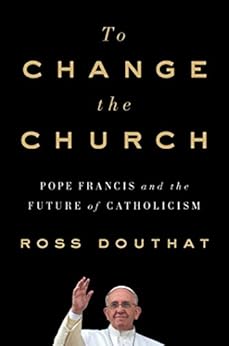 |
| Amazon link |
Ross Douthat is not very well known here but in the States he has a profile as a conservative commentator on the NYT. He is also a Catholic convert.
Here is what his fellow New York Times writer, Paul Elie, had to say about Douthat's work:
"To Douthat [Pope] Francis is an accommodationist, and decline has reached the apex of the church. “This is a hinge moment in the history of Catholicism,” he declares, “a period of theological crisis that’s larger than just the Francis pontificate but whose particular peak under this pope will be remembered, studied and argued about for as long as the Catholic Church endures.”I started the book somewhat sympathetic to Douthat's position - Pope Francis has not endeared himself with his vague anti-capitalism, ecological posturing and seeming inability to sort out the Vatican.
What immediately follows is an adroit, perceptive, gripping account of Catholic controversializing. Douthat sets out the liberal and conservative “master narratives” about the Second Vatican Council and then offers a third narrative that deftly blends the two.
He sketches the life and times of the future pope, Jorge Mario Bergoglio, the Argentine Jesuit archbishop of Buenos Aires. There’s commentary on past controversies and a brief history of Catholic teaching on marriage, from Matthew 19 (“What God has joined, let not man put asunder”) to Humanae Vitae, the 1968 encyclical in which Pope Paul VI upheld the ban on artificial birth control. ...
And then, as Douthat reaches what he sees as the heart of the matter — the Vatican synods on marriage and the family in 2014 and 2015 — his culture-warrior tendencies stir fully to life.
He casts the synods as a battle: warring factions, attacks and frontal assaults, purges and collaborators. Francis’ openness to the German cardinal Walter Kasper’s proposal to relax the ban on divorced-and-remarried people in Germany receiving Communion at Mass is framed as a liberal pope’s “crusade to change the church.”
Although Francis has invited free discussion more than any previous pope, his efforts to shape the synod’s outcome (he is the pope, after all) are seen as “stage-managing” and “deck-stacking.” The synod fathers’ disputes are rolled down the slippery slope and deemed a “full-scale theological crisis” in which the hope that Francis would foster unity and renewal is undone by the supposed liberals’ supposed desire to accommodate “the sexual revolution and all its works.”
Douthat’s own position is traditionalist-cum-literalist: Any relaxing of the Catholic teaching on marriage — one man, one woman, one time — means that core teachings can be changed; if core teachings can be changed, the Catholic Church is no longer the Catholic Church; and if the church is not the church, all hope is lost."
Douthat is a smart guy but he has a problem - blind faith. Once he committed to switching his critical intelligence off to accommodate a strangely-invisible super-presence, the fount of moral authority and one which extruded a portion of itself into a low-key itinerant Jewish preacher some two thousand years ago .. well, he felt he had to commit himself to Jesus's reported words as divinely-inspired axioms for life.
No matter the grievous consequences to perfectly respectable people (remarried divorcees - the case in point - enjoined to live as 'sister and brother'), the letter of the law must be served or the heavens shall fall. In the face of such egregious nonsense one can only wish more power to Francis's elbow.
As Elie observes:
"Vatican II was at once the church’s response to a crisis and the perpetuation of it. In less than five years the council fathers made changes whose number and scale dwarf the modest proposals floated in Francis’ pontificate — made them over the objections of Bill Buckley and other pundits who styled themselves as more Catholic than the pope. The biggest change had to do with the church’s relationship to Judaism, other churches and other religions.
In a few strokes, Jesus’ hard saying “No one comes to the Father except through me” and its Catholic expression (“Outside the church there is no salvation”) were softened and qualified. The change was profound and tradition-defying. Ever since, the church has affirmed the integrity of other faiths; ever since, Catholics have had to ask themselves, “Why be Catholic, when other ways are O.K., too?” Ever since, there has been no one clear answer."
No comments:
Post a Comment
Comments are moderated. Keep it polite and no gratuitous links to your business website - we're not a billboard here.